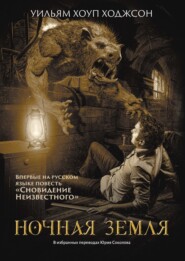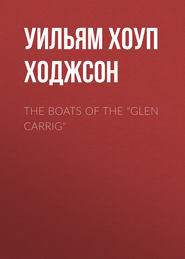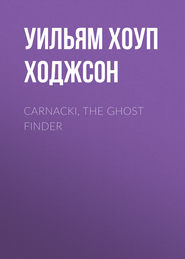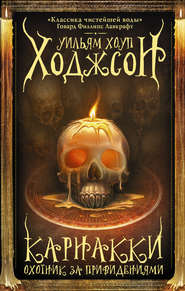По всем вопросам обращайтесь на: info@litportal.ru
(©) 2003-2024.
✖
The Ghost Pirates
Настройки чтения
Размер шрифта
Высота строк
Поля
"I dunno," said the first. "I wish I 'ad arsked the Second what 'e thought about it."
"I don't think it was a stowaway, somehow," I said, chipping in. "What would a stowaway want aloft? I guess he'd be trying more for the Steward's pantry."
"You bet he would, hevry time," said Stubbins. He lit his pipe, and sucked at it, slowly.
"I don't hunderstand it, all ther same," he remarked, after a moment's silence.
"Neither do I," I said. And after that I was quiet for a while, listening to the run of conversation on the subject.
Presently, my glance fell upon Williams, the man who had spoken to me about "shadders." He was sitting in his bunk, smoking, and making no effort to join in the talk.
I went across to him.
"What do you think of it, Williams?" I asked. "Do you think the Second
Mate really saw anything?"
He looked at me, with a sort of gloomy suspicion; but said nothing.
I felt a trifle annoyed by his silence; but took care not to show it.
After a few moments, I went on.
"Do you know, Williams, I'm beginning to understand what you meant that night, when you said there were too many shadows."
"Wot yer mean?" he said, pulling his pipe from out of his mouth, and fairly surprised into answering.
"What I say, of course," I said. "There are too many shadows."
He sat up, and leant forward out from his bunk, extending his hand and pipe. His eyes plainly showed his excitement.
"'ave yer seen—" he hesitated, and looked at me, struggling inwardly to express himself.
"Well?" I prompted.
For perhaps a minute he tried to say something. Then his expression altered suddenly from doubt, and something else more indefinite, to a pretty grim look of determination.
He spoke.
"I'm blimed," he said, "ef I don't tike er piy-diy out of 'er, shadders or no shadders."
I looked at him, with astonishment.
"What's it got to do with your getting a pay-day out of her?" I asked.
He nodded his head, with a sort of stolid resolution.
"Look 'ere," he said.
I waited.
"Ther crowd cleared"; he indicated with his hand and pipe towards the stern.
"You mean in 'Frisco?" I said.
"Yus," he replied; "'an withart er cent of ther piy. I styied."
I comprehended him suddenly.
"You think they saw," I hesitated; then I said "shadows?"
He nodded; but said nothing.
"And so they all bunked?"
He nodded again, and began tapping out his pipe on the edge of his bunk-board.
"And the officers and the Skipper?" I asked.
"Fresh uns," he said, and got out of his bunk; for eight bells was striking.
IV
The Fooling with the Sail
It was on the Friday night, that the Second Mate had the watch aloft looking for the man up the main; and for the next five days little else was talked about; though, with the exception of Williams, Tammy and myself, no one seemed to think of treating the matter seriously. Perhaps I should not exclude Quoin, who still persisted, on every occasion, that there was a stowaway aboard. As for the Second Mate, I have very little doubt now, but that he was beginning to realise there was something deeper and less understandable than he had at first dreamed of. Yet, all the same, I know he had to keep his guesses and half-formed opinions pretty well to himself; for the Old Man and the First Mate chaffed him unmercifully about his "bogy." This, I got from Tammy, who had heard them both ragging him during the second dog-watch the following day. There was another thing Tammy told me, that showed how the Second Mate bothered about his inability to understand the mysterious appearance and disappearance of the man he had seen go aloft. He had made Tammy give him every detail he could remember about the figure we had seen by the log-reel. What is more, the Second had not even affected to treat the matter lightly, nor as a thing to be sneered at; but had listened seriously, and asked a great many questions. It is very evident to me that he was reaching out towards the only possible conclusion. Though, goodness knows, it was one that was impossible and improbable enough.
It was on the Wednesday night, after the five days of talk I have mentioned, that there came, to me and to those who knew, another element of fear. And yet, I can quite understand that, at that time, those who had seen nothing, would find little to be afraid of, in all that I am going to tell you. Still, even they were much puzzled and astonished, and perhaps, after all, a little awed. There was so much in the affair that was inexplicable, and yet again such a lot that was natural and commonplace. For, when all is said and done, it was nothing more than the blowing adrift of one of the sails; yet accompanied by what were really significant details—significant, that is, in the light of that which Tammy and I and the Second Mate knew.
Seven bells, and then one, had gone in the first watch, and our side was being roused out to relieve the Mate's. Most of the men were already out of their bunks, and sitting about on their sea-chests, getting into their togs.
Suddenly, one of the 'prentices in the other watch, put his head in through the doorway on the port side.
"The Mate wants to know," he said, "which of you chaps made fast the fore royal, last watch."
"Wot's 'e want to know that for?" inquired one of the men.
"The lee side's blowing adrift," said the 'prentice. "And he says that the chap who made it fast is to go up and see to it as soon as the watch is relieved."
"Oh! does 'e? Well 'twasn't me, any'ow," replied the man. "You'd better arsk sum of t'others."
"Ask what?" inquired Plummer, getting out of his bunk, sleepily.
The 'prentice repeated his message.
The man yawned and stretched himself.
"Let me see," he muttered, and scratched his head with one hand, while he fumbled for his trousers with the other. "'oo made ther fore r'yal fast?" He got into his trousers, and stood up. "Why, ther Or'nary, er course; 'oo else do yer suppose?"
"I don't think it was a stowaway, somehow," I said, chipping in. "What would a stowaway want aloft? I guess he'd be trying more for the Steward's pantry."
"You bet he would, hevry time," said Stubbins. He lit his pipe, and sucked at it, slowly.
"I don't hunderstand it, all ther same," he remarked, after a moment's silence.
"Neither do I," I said. And after that I was quiet for a while, listening to the run of conversation on the subject.
Presently, my glance fell upon Williams, the man who had spoken to me about "shadders." He was sitting in his bunk, smoking, and making no effort to join in the talk.
I went across to him.
"What do you think of it, Williams?" I asked. "Do you think the Second
Mate really saw anything?"
He looked at me, with a sort of gloomy suspicion; but said nothing.
I felt a trifle annoyed by his silence; but took care not to show it.
After a few moments, I went on.
"Do you know, Williams, I'm beginning to understand what you meant that night, when you said there were too many shadows."
"Wot yer mean?" he said, pulling his pipe from out of his mouth, and fairly surprised into answering.
"What I say, of course," I said. "There are too many shadows."
He sat up, and leant forward out from his bunk, extending his hand and pipe. His eyes plainly showed his excitement.
"'ave yer seen—" he hesitated, and looked at me, struggling inwardly to express himself.
"Well?" I prompted.
For perhaps a minute he tried to say something. Then his expression altered suddenly from doubt, and something else more indefinite, to a pretty grim look of determination.
He spoke.
"I'm blimed," he said, "ef I don't tike er piy-diy out of 'er, shadders or no shadders."
I looked at him, with astonishment.
"What's it got to do with your getting a pay-day out of her?" I asked.
He nodded his head, with a sort of stolid resolution.
"Look 'ere," he said.
I waited.
"Ther crowd cleared"; he indicated with his hand and pipe towards the stern.
"You mean in 'Frisco?" I said.
"Yus," he replied; "'an withart er cent of ther piy. I styied."
I comprehended him suddenly.
"You think they saw," I hesitated; then I said "shadows?"
He nodded; but said nothing.
"And so they all bunked?"
He nodded again, and began tapping out his pipe on the edge of his bunk-board.
"And the officers and the Skipper?" I asked.
"Fresh uns," he said, and got out of his bunk; for eight bells was striking.
IV
The Fooling with the Sail
It was on the Friday night, that the Second Mate had the watch aloft looking for the man up the main; and for the next five days little else was talked about; though, with the exception of Williams, Tammy and myself, no one seemed to think of treating the matter seriously. Perhaps I should not exclude Quoin, who still persisted, on every occasion, that there was a stowaway aboard. As for the Second Mate, I have very little doubt now, but that he was beginning to realise there was something deeper and less understandable than he had at first dreamed of. Yet, all the same, I know he had to keep his guesses and half-formed opinions pretty well to himself; for the Old Man and the First Mate chaffed him unmercifully about his "bogy." This, I got from Tammy, who had heard them both ragging him during the second dog-watch the following day. There was another thing Tammy told me, that showed how the Second Mate bothered about his inability to understand the mysterious appearance and disappearance of the man he had seen go aloft. He had made Tammy give him every detail he could remember about the figure we had seen by the log-reel. What is more, the Second had not even affected to treat the matter lightly, nor as a thing to be sneered at; but had listened seriously, and asked a great many questions. It is very evident to me that he was reaching out towards the only possible conclusion. Though, goodness knows, it was one that was impossible and improbable enough.
It was on the Wednesday night, after the five days of talk I have mentioned, that there came, to me and to those who knew, another element of fear. And yet, I can quite understand that, at that time, those who had seen nothing, would find little to be afraid of, in all that I am going to tell you. Still, even they were much puzzled and astonished, and perhaps, after all, a little awed. There was so much in the affair that was inexplicable, and yet again such a lot that was natural and commonplace. For, when all is said and done, it was nothing more than the blowing adrift of one of the sails; yet accompanied by what were really significant details—significant, that is, in the light of that which Tammy and I and the Second Mate knew.
Seven bells, and then one, had gone in the first watch, and our side was being roused out to relieve the Mate's. Most of the men were already out of their bunks, and sitting about on their sea-chests, getting into their togs.
Suddenly, one of the 'prentices in the other watch, put his head in through the doorway on the port side.
"The Mate wants to know," he said, "which of you chaps made fast the fore royal, last watch."
"Wot's 'e want to know that for?" inquired one of the men.
"The lee side's blowing adrift," said the 'prentice. "And he says that the chap who made it fast is to go up and see to it as soon as the watch is relieved."
"Oh! does 'e? Well 'twasn't me, any'ow," replied the man. "You'd better arsk sum of t'others."
"Ask what?" inquired Plummer, getting out of his bunk, sleepily.
The 'prentice repeated his message.
The man yawned and stretched himself.
"Let me see," he muttered, and scratched his head with one hand, while he fumbled for his trousers with the other. "'oo made ther fore r'yal fast?" He got into his trousers, and stood up. "Why, ther Or'nary, er course; 'oo else do yer suppose?"













